| Srl | Item |
| 1 |
ID:
121933
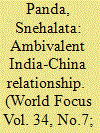

|
|
|
|
|
| Publication |
2013.
|
| Summary/Abstract |
Strong commercial ties moving in tandem with threats and competition epitomize China's relation with India. The end of the cold war added a new dimension to their relationship because interests of both the countries converged on economic development. Strategies were innovated to promote this objective. But economic relationship has not created an environment of trust to shield their bonding from misperceptions and competition. Ironically the trust deficit is due to antithetical perceptions emerging from the divergence of their interests cloaked in the very process of engagement activated in the 1990s.
|
|
|
|
|
|
|
|
|
|
|
|
|
|
|
|
| 2 |
ID:
121940
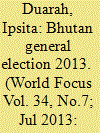

|
|
|
|
|
| Publication |
2013.
|
| Summary/Abstract |
The 2013 general election to the National Assembly and National Council of Bhutan laid another milestone of development of democracy in the Himalayan State. Bhutan became democracy in 2008 when it hold the first ever elections to the National Assembly and National Council. The hundred years old absolute monarchy transforms itself into a constitutional democracy without any internal or external demand. After centuries of Shabdrung rule (1616-1907), Bhutan became a hereditary monarchy in 1907.
|
|
|
|
|
|
|
|
|
|
|
|
|
|
|
|
| 3 |
ID:
121939
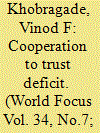

|
|
|
|
|
| Publication |
2013.
|
| Summary/Abstract |
India's relations with its neighbours are full of stress and confrontations as it is presumed that India's every neighbouring state seem ready to pose security threat to India. Therefore, India always remained restless in the region to protect its security interests. Moreover, India's posture in South Asia has always supposed to be disturbing among the states in the region. However, India's relations with Sri Lanka have been cordial than any other state in South Asia.
|
|
|
|
|
|
|
|
|
|
|
|
|
|
|
|
| 4 |
ID:
121928
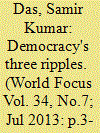

|
|
|
|
|
| Publication |
2013.
|
| Summary/Abstract |
South Asia, it is argued, has also been touched by democracy's fourth wave. The pro-democracy movements in Nepal, Pakistan and Bangladesh are a case in point. One may add the recent experiment with democratization in Bhutan to this list; but the experiment is not known to have been catalyzed by any popular movement for democracy in the Himalayan Kingdom. By contrast, the liquidation of the Liberation Tigers of Tamil Eelam (LTTE) and the military solution to the insurgency problem in Sri Lanka seem to have reinforced the stronghold of family and ethnic Sinhala rule in the tiny island nation. While these experiences have been part of the present history of South Asia, it is difficult to say whether these have really been the demonstration effect of the Arab Spring sweeping across countries of West Asia and parts of Africa.
|
|
|
|
|
|
|
|
|
|
|
|
|
|
|
|
| 5 |
ID:
121942


|
|
|
|
|
| Publication |
2013.
|
| Summary/Abstract |
The word Maldives is a western connotation of the Sanskrit word "Mala Dwee" which means a garland of islands. This beautiful cluster of about 1200 islands of which approximately 200 are inhabited, lies in the Indian Ocean, south of the Lakshadweep islands. It is about 400 kilometres away from the Indian border. The Indo - Maldivian association has been a long one. The ties are deep rooted in ethnic, cultural, religious and historical commonalities.
|
|
|
|
|
|
|
|
|
|
|
|
|
|
|
|
| 6 |
ID:
121938
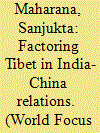

|
|
|
|
|
| Publication |
2013.
|
| Summary/Abstract |
In the borderless world, demarcating boundaries between and among the countries or the border issue is an important problem from historical period. The countries have been engaging in the border conflict, the solution of which would not be found in one day conversations. On the one hand Tibet issue is related to India-China ongoing border problem and on the other hand India supports the Tibetans on humanitarian ground for the preservation of their culture and religion and provides Dalai Lama and Tibetan refugees to establish government in exile in India.
|
|
|
|
|
|
|
|
|
|
|
|
|
|
|
|
| 7 |
ID:
121937


|
|
|
|
|
| Publication |
2013.
|
| Summary/Abstract |
The relationship between Nepal and India is often described as unique. Geographical proximity, an open border, and cultural, civilizational, historical and social bonds have intimately brought together the two sides from ancient times to the present. Except during a few short-lived phases of "hostility," the two countries have been able to overcome the pitfalls of the "familiarity breeds contempt" dictum.
|
|
|
|
|
|
|
|
|
|
|
|
|
|
|
|
| 8 |
ID:
121936
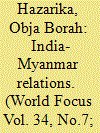

|
|
|
|
|
| Publication |
2013.
|
| Summary/Abstract |
India's relations with Myanmar have undergone several changes. During the early decades of military rule in Myanmar, India, wanted to tread the moral high ground and stand up for democracy and human rights, and thus ended up losing much-valued strategic space to China.
|
|
|
|
|
|
|
|
|
|
|
|
|
|
|
|
| 9 |
ID:
121932
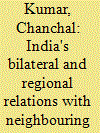

|
|
|
|
|
| Publication |
2013.
|
| Summary/Abstract |
Maintaining good relations with neighbours is the first priority for any country. India has close historical, religious, economic, ethnic and linguistic relationships with all neighbouring states. Ideally, India would prefer a peaceful, prosperous neighbourhood responsive to its own needs and wishes. India's relations with her neighbours occupy a central place in India's foreign policy. India is ready to walk the extra mile to strengthen bridges of friendship and create new opportunities for the growth, security and well-being of neighbours. India's neighbours are Afghanistan, Bangladesh, Bhutan, China, Maldives, Myanmar, Nepal, Pakistan and Sri Lanka. It shares either land or maritime borders with all of them.
|
|
|
|
|
|
|
|
|
|
|
|
|
|
|
|
| 10 |
ID:
121941
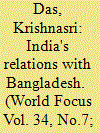

|
|
|
|
|
| Publication |
2013.
|
| Summary/Abstract |
Although India played a major role in the establishment of an independent Bangladesh on April 17, 1971, New Delhi's relations with Dhaka, the capital of Bangladesh, were neither close nor free from dispute . In 1975 Bangladesh began to move away from the linguistic nationalism that had marked its liberation struggle and linked it to India's West Bengal state. Instead, Dhaka stressed Islam as the binding force in Bangladeshi nationalism.
|
|
|
|
|
|
|
|
|
|
|
|
|
|
|
|
| 11 |
ID:
121934
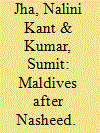

|
|
|
|
|
| Publication |
2013.
|
| Summary/Abstract |
While there is no doubt about linkages between India's economic development, peace and security and internal transition in its neighbour countries, the Indian Government has often not responded timely and effectively towards crisis in its neighbouring countries, leading to adverse impact on India's Interests.
|
|
|
|
|
|
|
|
|
|
|
|
|
|
|
|
| 12 |
ID:
121930


|
|
|
|
|
| Publication |
2013.
|
| Summary/Abstract |
The Look East Policy (LEP) of India reiterates the relevance of mutual solidarity and mutual interdependence as an imperative for peace and stability in the extended Asia-Pacific neighbourhood architecture. In its thrust to bolster the essence of Indo-ASEAN (Association of South East Asian Nations) cooperation the Policy espouses to optimise the synergies between India and its South East Asian neighbours and thus aims to situate India's evolving eminence in an intensely dynamic geo-strategic environment.
|
|
|
|
|
|
|
|
|
|
|
|
|
|
|
|
| 13 |
ID:
121935
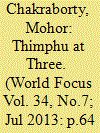

|
|
|
|
|
| Publication |
2013.
|
| Summary/Abstract |
The Thimphu SAARC Summit held in 2010 has definitely been a watershed in the recent trajectory of Indo-Pakistan relations. The Summit paved the way for turning the tide of trust deficit in the aftermath of the 2008 Mumbai carnage towards trust building. In the post-Thimphu period, a number of factors have facilitated the stepping up of bilateral ties. On the other hand, there have been occasional blemishes in the complexion of mutual relations as well. Keeping this backdrop in mind, the present article attempts to analyze the path in which the tidal stream of Indo-Pakistan relations is flowing and what the future has in store for it.
|
|
|
|
|
|
|
|
|
|
|
|
|
|
|
|
| 14 |
ID:
121929
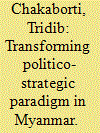

|
|
|
|
|
| Publication |
2013.
|
| Summary/Abstract |
Myanmar is a country with significant politico-strategic imprint for the countries of South and Southeast Asia, and India is no exception to this phenomenon. Given its endowment of rich natural resources and a strong historical link with India, the changing politico-economic dynamics in the country, against the backdrop of the transformation from a military-led to a democratic administration, augurs well for the development of bilateral ties between India and Myanmar in the present global order. However, the casting shadow of China and the United States, both historically as well as in recent times, on the politico-economic and strategic profile of Myanmar definitely has a deep impact on Indian foreign policy formulation and practice, given the renewed importance accorded to Yangon within the domain of the 'Look East' policy. It is in this matrix that the present article tries to analyze the imprints of the shifting politico-strategic paradigm in Myanmar on India through the prism of the chosen parameters.
|
|
|
|
|
|
|
|
|
|
|
|
|
|
|
|
| 15 |
ID:
121931


|
|
|
|
|
| Publication |
2013.
|
| Summary/Abstract |
Trafficking in women is a momentous disobedience of Human Rights and one of the most solemn organized crimes of the day, transcending cultures, geography and time. The response by the agencies concerned in addressing the issues has been far from satisfactory, which has exacerbated the violations and harm to the trafficked persons.
|
|
|
|
|
|
|
|
|
|
|
|
|
|
|
|